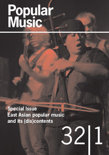
Popular Music
Scope & Guideline
Exploring the Soundtrack of Society
Introduction
Aims and Scopes
- Interdisciplinary Research on Popular Music:
The journal emphasizes an interdisciplinary approach, encouraging contributions that draw from musicology, sociology, cultural studies, and anthropology to provide a comprehensive understanding of popular music phenomena. - Cultural Contextualization:
Papers often focus on the cultural, historical, and political contexts of popular music, exploring how music interacts with identity, community, and societal issues. - Global Perspectives:
The journal promotes research that highlights global music practices, examining the influence of local traditions and transnational flows on popular music forms. - Technological Impact on Music:
There is a consistent focus on how technology shapes music production, distribution, and consumption, including discussions on digital media, streaming, and the evolution of music formats. - Exploration of Marginalized Voices:
The journal is committed to exploring the music of underrepresented groups, addressing issues of race, gender, and class within the popular music landscape. - Critical Analysis of Genres:
It provides a platform for critical analyses of various genres, examining their cultural significance, evolution, and the socio-political implications of their narratives.
Trending and Emerging
- Intersectionality in Music:
There is an increasing focus on intersectionality, particularly how race, gender, and sexuality intersect within popular music contexts, leading to nuanced discussions about representation and identity. - Music and Activism:
The journal is witnessing a rise in studies examining the relationship between music and social movements, highlighting how popular music serves as a form of activism and resistance against political and social injustices. - Digital Culture and Music Consumption:
As digital platforms reshape music consumption, there is a growing interest in exploring the implications of streaming, social media, and digital production on music practices and audience engagement. - Globalization and Locality:
Emerging research is increasingly exploring the tensions between globalization and local music practices, examining how global influences are reinterpreted within local contexts. - Mental Health and Music:
Recent publications are beginning to explore the connections between mental health and music, investigating how popular music can serve as a therapeutic tool or a reflection of societal mental health trends.
Declining or Waning
- Traditional Genre Studies:
Research focusing solely on traditional genre classifications appears to be waning, as the journal shifts towards more fluid and hybrid musical forms that reflect contemporary cultural realities. - Historical Retrospectives:
While historical analysis remains relevant, there is a noticeable decrease in papers solely dedicated to historical retrospectives without connecting to current sociopolitical issues or contemporary music practices. - Static Cultural Narratives:
Contributions that present static or uncritical narratives about popular music culture are becoming less frequent, with a growing preference for dynamic analyses that consider ongoing changes and challenges within the music industry.
Similar Journals
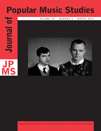
Journal of Popular Music Studies
Charting the Cultural Currents of Popular MusicJournal of Popular Music Studies, published by University of California Press, is a preeminent academic journal dedicated to the exploration and analysis of popular music and its cultural implications. With an ISSN of 1524-2226 and an E-ISSN of 1533-1598, this journal encompasses a range of methodologies, encouraging interdisciplinary dialogue across fields such as musicology, cultural studies, and sociology. Since its inception in 1988, it has provided a platform for critical examination of popular music through various lenses, contributing significantly to the understanding of music in contemporary society. The journal maintains a robust reputation, currently holding a Q2 ranking in the Music category of Scopus, positioning itself within the 58th percentile among its peers. As an invaluable resource for researchers, professionals, and students alike, the Journal of Popular Music Studies remains committed to fostering innovative scholarship and discussions that illuminate the impact of popular music on social and cultural landscapes.

Studia Universitatis Babes-Bolyai Musica
Bridging Disciplines in the World of MusicStudia Universitatis Babes-Bolyai Musica is a prestigious academic journal dedicated to the field of musicology, published by UNIV BABES-BOLYAI. Since its inception, it has strived to foster scholarly communication and share groundbreaking research that spans various music-related disciplines, including ethnomusicology, music theory, and performance studies. The journal operates under an Open Access model since 2021, ensuring that its content is freely accessible to a global audience of researchers, professionals, and students interested in advancing their knowledge and understanding of music. By providing a platform for high-quality, peer-reviewed articles, Studia Universitatis Babes-Bolyai Musica plays a vital role in promoting significant contributions to the evolving discourse in music studies. Its commitment to intellectual rigor and openness aligns with contemporary academic trends, making it an essential resource in the realm of music research.

FOLK MUSIC JOURNAL
Cultivating a Deeper Appreciation for Folk ArtistryFolk Music Journal, published by the English Folk Dance Song Society, is a prominent publication within the fields of Music and Visual Arts and Performing Arts. This journal, based in the United Kingdom at Cecil Sharp House, has been instrumental in advancing the study and appreciation of folk music, sharing invaluable research and insights from 2002 until its recent coverage concluded in 2020. Notably indexed with a Q3 rank in both the Music and Visual Arts categories for 2023, it stands as a significant resource for researchers, professionals, and students alike, contributing to a deeper understanding of folk music's cultural impact. Although it does not currently offer Open Access, the journal has fostered scholarly discourse, reflecting its vital role in the preservation and analysis of traditional musical forms.

Musicologica Brunensia
Exploring the Harmony of MusicologyMusicologica Brunensia, an esteemed journal published by Masaryk University, Faculty of Arts, serves as a significant platform for the dissemination of knowledge in the field of musicology. Based in the Czech Republic, this Open Access journal has been facilitating scholarly communication since 2009, allowing unrestricted access to its rich array of research articles. With an ISSN of 1212-0391 and an E-ISSN of 2336-436X, Musicologica Brunensia proudly holds a Q3 ranking in the Music category as of 2023, reflecting its dedication to advancing research in the arts and humanities, particularly music. The journal accepts contributions spanning diverse topics within music studies, fostering interdisciplinary dialogue among researchers, professionals, and students alike. Located at Arne Novaka 1, Brno, 60200, Czech Republic, Musicologica Brunensia is poised to continue its journey of promoting innovative scholarship in musicology until 2024 and beyond, making it a valuable resource for anyone passionate about the field.

Muzikoloski Zbornik
Bridging Tradition and Modernity in Music ResearchMuzikoloski Zbornik is a prominent open-access journal in the field of musicology, published by the esteemed University of Ljubljana Press since 1965. Hailing from Slovenia, this journal has been dedicated to advancing the study of musical heritage, theory, and practice, serving as a vital platform for researchers, professionals, and students alike. With a notable Q2 category ranking in the field of music and a Scopus ranking of 109 out of 180 in Arts and Humanities, Muzikoloski Zbornik showcases high-quality research, fostering discourse and collaboration among scholars globally. The journal embraces a diverse range of topics, from ethnomusicology to music education, ensuring its relevance in an ever-evolving academic landscape. By providing unrestricted access to its content, it champions the dissemination of knowledge and supports the growth of the musicology discipline.
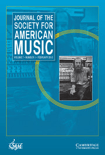
Journal of the Society for American Music
Illuminating the Cultural Contexts of American MusicThe Journal of the Society for American Music is a leading academic journal dedicated to the study of American music and its diverse cultural contexts. Published by Cambridge University Press, this journal serves as a vital platform for researchers and professionals in the fields of musicology, ethnomusicology, and American studies, contributing significantly to scholarly discourse and advancing knowledge in these areas. With an impressive impact factor reflecting its academic rigor, it is placed in Q2 of the music category as of 2023 and ranks #55 out of 180 in the Arts and Humanities segment, placing it in the 69th percentile among its peers. Since its inception, the journal has published a wealth of articles, reviews, and critical studies that explore the rich tapestry of American musical traditions from historical and contemporary perspectives. It operates under a subscription model, ensuring a wide distribution and accessibility to its important findings. Researchers, students, and professionals alike will find the journal an essential resource for advancing their understanding of the dynamic landscape of American music.

Opus
Advancing Knowledge in MusicologyOpus is an esteemed open-access journal published by the Associação Nacional de Pesquisa e Pós-Graduação em Música in Brazil, focusing on the field of music studies. With an ISSN of 1517-7017, Opus has been dedicated to fostering innovative research since its inception and has embraced the open-access model since 2009, ensuring that its findings are readily accessible to scholars and enthusiasts globally. The journal has achieved a commendable Q2 ranking in Music as of 2023, showcasing its impact and relevance within the arts and humanities. Although currently ranked #130 out of 180 in Scopus in the music category, Opus maintains a commitment to enhancing the scholarly discourse in musicology through empirical studies, theoretical analyses, and interdisciplinary approaches. The journal's convergence over the years, from 2017 to 2024, reflects its dedication to evolving educational and research methodologies in music. Situated in the vibrant academic landscape of Campinas, SP, Brazil, Opus invites researchers, professionals, and students to contribute to its mission of exploring the multifaceted dimensions of music.
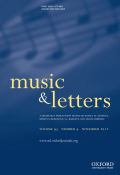
MUSIC & LETTERS
Bridging the Worlds of Music and LiteratureMUSIC & LETTERS, published by Oxford University Press, is a prominent academic journal that has been at the forefront of musicology and music studies since its inception in 1920. With an ISSN of 0027-4224 and an E-ISSN of 1477-4631, the journal provides a platform for scholarly articles that explore the rich interplay between music and literature, contributing significantly to the understanding of musical context, form, and societal impact. As of 2023, it holds a respectable Q3 rank in Music within its category, positioned at Rank #66 out of 180 in the Scopus Arts and Humanities Music category. Despite not being an Open Access journal, its rigorous peer-review process and commitment to high-quality research make it an essential resource for researchers, professionals, and students alike. The journal's scope encompasses various genres and historical periods, ensuring a comprehensive examination of music's role in culture and community, thereby enhancing the scholarly discourse within this vibrant field. Based in the United Kingdom, at Great Clarendon St, Oxford OX2 6DP, England, MUSIC & LETTERS continues to inspire and inform the global music scholarly community.

Problemy Muzykalnoi Nauki-Music Scholarship
Advancing Knowledge in Music Theory and CultureWelcome to Problemy Muzykalnoi Nauki-Music Scholarship, a leading journal in the field of music scholarship published by the esteemed Gnesin Russian Academy of Music. With an ISSN of 2782-358X and an E-ISSN of 2782-3598, this Open Access journal has been committed to the dissemination of high-quality research since 2009, making scholarly work accessible to a global audience. Covering diverse aspects of music theory, history, and its socio-cultural impacts, Problemy Muzykalnoi Nauki serves as an essential platform for scholars, educators, and practitioners in the arts and humanities, as well as in social sciences related to music education. While its Scopus coverage was discontinued in 2021, the journal remains influential, holding a rank of #48 in the Arts and Humanities category and a percentile of 67th, showcasing its relevance and rigor in the discipline. We invite researchers and students alike to explore the rich contributions made within these pages, fostering a deeper understanding and appreciation of music in contemporary society.
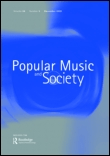
POPULAR MUSIC AND SOCIETY
Decoding the Rhythm of Contemporary CulturePOPULAR MUSIC AND SOCIETY, published by Taylor & Francis Ltd, is a leading interdisciplinary journal that explores the intricate relationships between popular music and social dynamics. With an ISSN of 0300-7766 and E-ISSN 1740-1712, this esteemed journal has established a significant presence in the academic community since its inception, covering a broad scope from 1971 and continuing to provide critical insights into contemporary issues in popular music research. Currently classified as Q1 in both Cultural Studies and Music for 2023, it ranks impressively within the top quartile of its fields, showcasing its scholarly impact and relevance. With a Scopus ranking of #42 in Music and #305 in Cultural Studies, POPULAR MUSIC AND SOCIETY serves as an essential platform for researchers, educators, and students to engage with innovative theories and analyses that reflect the evolving cultural landscape. The journal does not currently offer Open Access options, ensuring a focused readership that values in-depth scholarly work. Nestled in the United Kingdom, this publication continues to shape discussions around music's role in society, making it a pivotal resource for those dedicated to understanding the cultural significance of popular music.